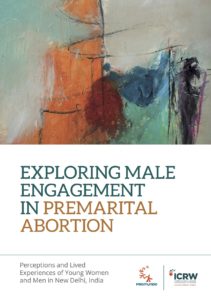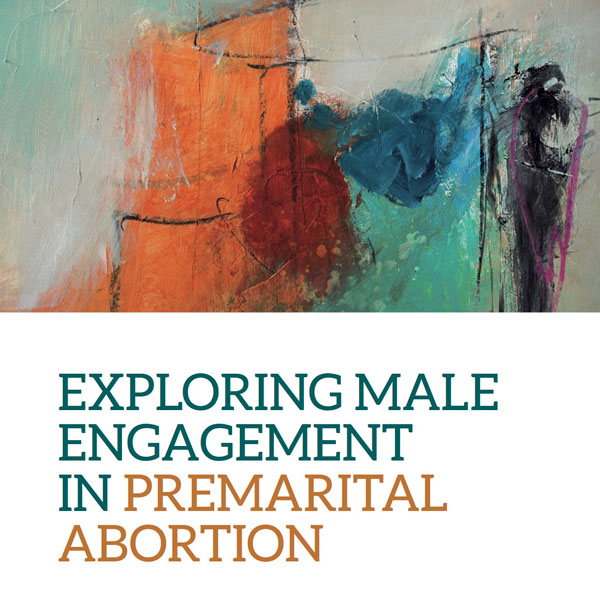 A new report from Equimundo and the International Center for Research on Women (ICRW), Exploring Male Engagement in Premarital Abortion: Young Women and Men’s Perceptions and Lived Experiences in New Delhi, India, launches today. It sheds new light on how stigma, social norms, and masculine stereotypes influence men’s involvement in premarital abortion and the post-abortion journey.
A new report from Equimundo and the International Center for Research on Women (ICRW), Exploring Male Engagement in Premarital Abortion: Young Women and Men’s Perceptions and Lived Experiences in New Delhi, India, launches today. It sheds new light on how stigma, social norms, and masculine stereotypes influence men’s involvement in premarital abortion and the post-abortion journey.
In India, unsafe abortion is the third leading cause of maternal death, and it contributes 8% to all such deaths every year. Even though unmarried women in India have the legal right to abortion, they face challenges because of the secrecy, shame, and stigma associated with premarital sex and abortion, in addition to difficulties accessing services and information.
In light of these challenges, as well as a lack of existing research on the premarital abortion journeys of young men and women, Equimundo and ICRW conducted a qualitative study to investigate young men’s attitudes, perceptions, and experiences as partners in relation to premarital abortion in New Delhi.
The study included 17 in-depth interviews with young unmarried people seeking abortion care (men and women), 6 focus group discussions with young men and women, and 15 key informant interviews with experts and service providers in New Delhi in 2018. To unpack the socio-economic factors that influence the perceptions, attitudes, and experiences of young people, participants were selected from diverse socio-economic contexts.
Key findings include:
- At the abortion stage, access to non-judgmental medical advice and psychosocial help or counseling is not available for most young people. Faced with anxiety and guilt caused by stigma associated with premarital sex, youth encounter various complications. Little or no sex education implies little or no knowledge about pregnancy-related issues. Lack of open communication and support systems cause young people seeking abortion care to rely upon their peers’ ill-informed, incomplete, and dated information, which leads to greater health risks and trauma.
- Men often leverage their social privilege to support their partners in premarital abortion seeking. Male study participants – acting from a position of societal privilege that affords them greater mobility and autonomy – reported acting as an “all-in-one service provider” for their partners. They sought information about pregnancy kits, abortion pills, and clinics; where needed, they purchased medication, spoke to doctors, accompanied their partners to the clinics, and paid for the abortion. Popular discourse and perceptions tend to paint unmarried men in premarital relations as over-sexed, exploitative, and irresponsible. However, service providers reported seeing a steady increase in the number of men who show up with their partners for abortions.
- Male support for their partners seeking abortion is driven by gender stereotypes around men being the provider and caretaker in relationships, along with a concern for their partners’ well-being. Male participants thought it was their responsibility to preserve and protect their partners’ reputations and honor, and so they felt duty-bound to provide support for abortion.
- A key factor that shapes men’s involvement in abortion seeking is the shame and stigma associated with premarital sex. Male participants reported feeling guilt, shame, and fear for having put their partners in the situation of needing an abortion – either propelling them to stay with their partners and offer support, or to end the relationship and become untraceable.
- Medical providers also propagate stigma around abortion. This acts as a barrier to young men and women using safe, non-judgmental abortion services and forces them to resort to pills. Participants reported perceiving that health facilities exclude men at the time of abortion and that medical personnel reproach men’s involvement. As a result, male partners often prefer to stay outside the medical premises.
The findings reveal opportunities to engage with men to advance sexual and reproductive health and rights for all. Recommendations include:
- Discuss men’s roles as participants in and supporters of sexual and reproductive health and rights (SRHR): Men’s roles are often neglected in discussions around SRHR; this both results from and contributes to the dominant belief that sexual and reproductive health is a woman’s domain. However, this study shows that men appear willing to share the burden of premarital pregnancy and abortion with their partners, and that they want to play a supportive role.
- Leverage men’s capacity as information seekers and providers: Men with personal experiences of premarital pregnancy and abortion are in unique positions to proactively transmit more accurate information and dispel myths about this theme among their peers. Engaging men as seekers, carriers, and disseminators of information can encourage communication on these issues, promote contraceptive use, and positively influence safe abortion practices.
- Work with men to address harmful gender norms: Men hold significant decision-making power, and gender norms have a strong bearing on decisions made about premarital sex and abortion. Encouraging men to respect women, promote equal decision-making, and challenge attitudes that cause sexual and gender-based violence and inequality is critical.
- Encourage service providers’ positive interactions with men: Healthcare providers’ perceptions, attitudes, and practices can substantially affect access to and quality of abortion services. If service providers interact with male partners in positive ways, they can favorably impact a woman’s abortion journey, as well as help address men’s specific concerns about safe sexual behavior.
Men can and must play an important role in affirming women’s access to safe abortion care, as well as in being allies in securing full and equal rights for women. In addition to the potential benefits for individual women, men’s involvement as advocates may, at a broader level, advance women’s access to safe abortion and quality care. Safe abortion with dignity is every woman’s right and is, as noted in the recent Guttmacher-Lancet Commission report, a key pillar of a comprehensive SRHR rights platform.
Read the full report here.
